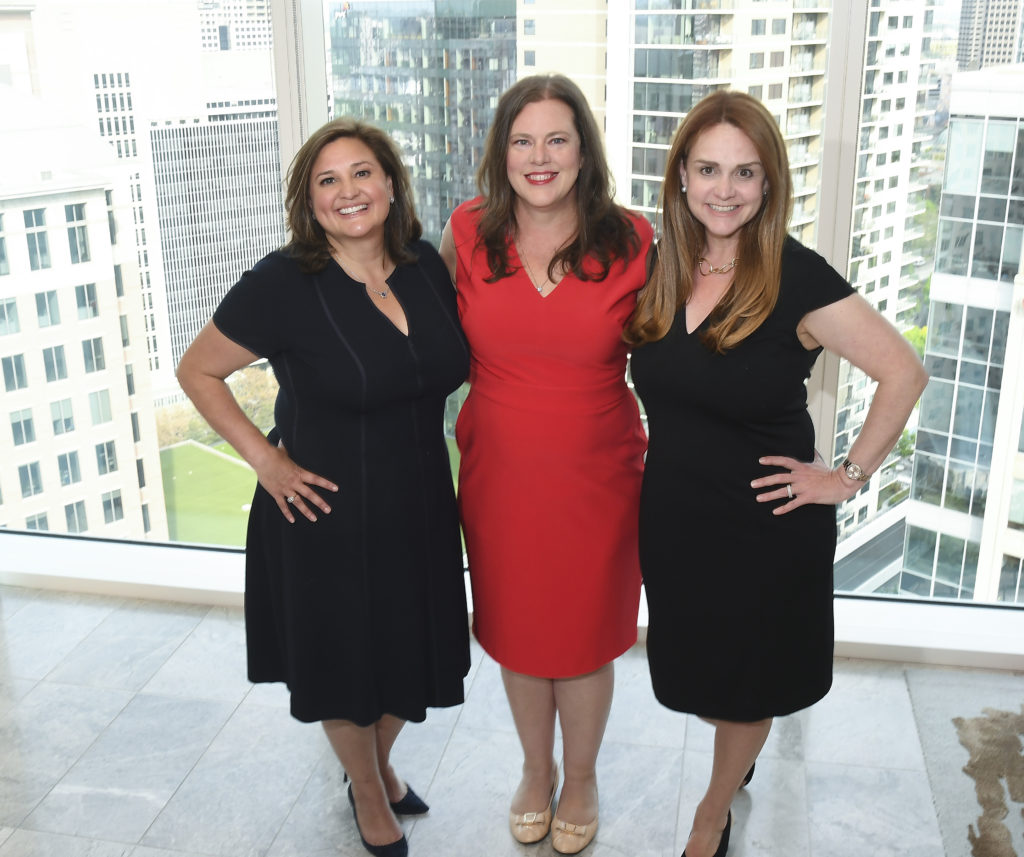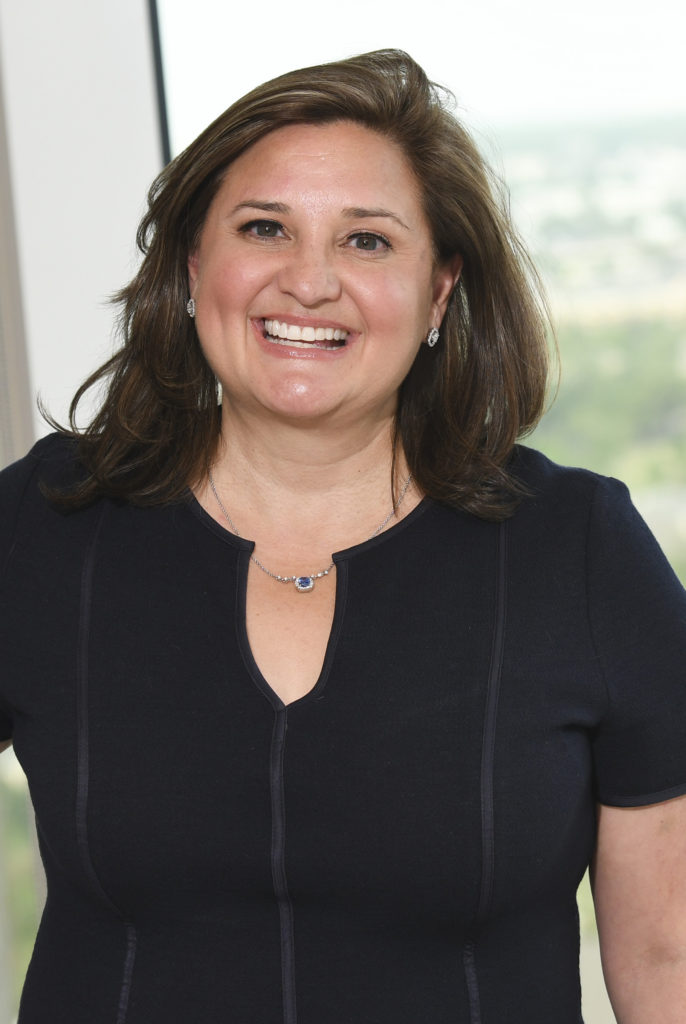
Yolanda Garcia, Lori Browne and Angela Zambrano
Mergers and acquisitions that end up in high-stakes litigation are often about two issues: the fine print of the transaction agreement and the intent of the buyers and sellers.
No one knows this more than Forterra Inc. General Counsel Lori Browne, who spent the past six years battling the German company that sold the water and drainage pipe maker to private equity fund Lone Star for $1.3 billion on Christmas Eve 2014.
Noting Forterra’s extraordinary financial success after the transaction, HeidelbergCement AG filed a lawsuit in Delaware Chancery Court citing hundreds of issues in its effort to enforce a nine-digit purchase-price “earnout” provision in the sale agreement.
But Browne, who joined Forterra a couple of months after the deal closed in 2015, studied the transactional documents and dug deep into the company’s accounting and financial systems.
PREMIUM SUBSCRIBERS: FIND A SPECIAL Q&A WITH LORI BROWNE BY CLICKING HERE.
“The acquisition’s purchase agreement included an earnout provision that would provide additional compensation of up to $100 million based on a specified earnings target,” Browne told The Texas Lawbook.
The primary issue was the calculation of company earnings. Heidelberg sought the full $100 million earnout. Forterra and Lone Star maintained that Heidelberg was not entitled to any additional funds under the terms of their agreement.
“At $100 million, this particular earnout provision was particularly sizable, and the case presented important legal issues related to jurisdiction of the arbitrator and the significance of including different dispute resolution mechanisms in the terms of an agreement,” Browne said.
The Forterra GC approached Sidley Austin partners Angela Zambrano and Yolanda Cornejo Garcia in Dallas with a novel strategic litigation plan that certainly had risks but one that Browne felt was supported by the evidence – the fine print of the agreement and the intent of the two parties involved in the transaction.
The strategy paid off. The Delaware Chancery Court rejected Heidelberg’s argument, and an arbitrator last September said Forterra owed Heidelberg $0.
“There were hundreds of accounting disputes being claimed by Heidelberg, and there were a multitude of ways we could have lost $100 million,” Zambrano said. “We basically had to win on everything. Lori developed a thoughtful and creative defense that proved to be 100% successful.”
Citing the extraordinary litigation success, especially during the era of Covid-19 and Zoom trials, the Association of Corporate Counsel’s DFW Chapter and The Texas Lawbook are honoring Browne and Sidley with the 2020 DFW Outstanding Corporate Counsel Award for Business Litigation of the Year.

Browne and Sidley will officially be recognized and be presented with the Business Litigation of the Year award June 3 at the 2020 DFW Outstanding Corporate Counsel Awards ceremony at the George W. Bush Institute.
“This case has been quite an adventure,” Browne said. “I never thought at the beginning that the dispute would go to trial, but they believed in their position and we strongly believed in our position.
“I was absolutely convinced that our argument was right, but the issues were so complex and then having to present our entire case remotely by Zoom presented all kinds of questions about how it would turn out,” she said.
Zambrano points out that Browne is one of the youngest corporate GCs in North Texas.
“The steep incline of her career and success is sure to continue, as her reputation internally and within the community has been burnished by her successful navigation of Forterra through the challenges of the pandemic,” Zambrano said. “Lori is the ultimate counselor for her company, easily shifting between complicated corporate transactions and reporting issues to complex commercial litigation and crisis management.”
Garcia, who has been friends with Browne since their days together at the University of Texas School of Law, said Browne has an “analytical mind and is very calm in crisis, so everyone on her team reacts accordingly.”
“Lori doesn’t overreact to setbacks,” Garcia said. “Lori is confident and willing to take calculated risks rather than just a ‘most protective’ or ‘least likely to lose’ standard path.”
Vinson & Elkins litigation partner Matt Moran told The Texas Lawbook in an interview in 2020 that Browne is successful because she “connects with and relates to all types of people – senior executives, employees, business people, outside counsel and opposing counsel.
“Lori has an in-depth understanding of the business and is a super quick study on complex legal and regulatory issues that touch the various aspects of Forterra’s business,” Moran said. “She understands that there is often more than one possible solution to a given problem, and she has the creativity and leadership – along with the legal and business acumen – to identify and implement the right solution under the circumstances.”
Browne grew up in Austin. Her parents worked in state government in IT-related roles.
When Browne was 7 years old, her friend’s father, who was in law school at UT, invited her to attend one of his classes after she constantly peppered him with questions about law.
“When I attended, the professor made a big deal out of having a young kid in the class, and I listened and even understood some of the lesson,” she said. “Of course, from that minute on, I wanted to go to be a lawyer, which was a big change from wanting to be a rock star.”
Through her studies in English and history at Texas A&M, Browne studied abroad for a summer.

“I was absolutely convinced that our argument was right, but the issues were so complex and then having to present our entire case remotely by Zoom presented all kinds of questions about how it would turn out.” — Lori Browne
Photo: Jake Dean
“I not only caught the travel bug, I want to go everywhere,” she says. “But I think it really opened my perspective to how different other places can be and taught me not to make assumptions about others without trying to understand them.”
Browne went to law school at the University of Texas and had classes in the very room where she was first exposed to the law two decades earlier.
In 1999, she joined Fulbright & Jaworski’s litigation practice. In 2002, she jumped to Weil, Gotshal & Manges, where she practiced with Garcia and Zambrano.
In 2007, Browne decided she wanted a “change of pace from the firm lifestyle,” and an opportunity came her way to be the general counsel of FairPay Solutions, an Addison-based, small venture capital-backed company.
“I thought I would enjoy being in-house because of the ability to focus on a single client and really understand deeply the interconnectedness of issues, but had no idea how much I would enjoy being part of the business team and helping to solve problems and enable the business to move forward and achieve its goals,” Browne told The Texas Lawbook in 2019. “I truly love being a trusted member of – and advisor to – our management team.”
In 2015, private equity-owned Forterra was looking for its first general counsel to form a legal department from scratch. Just months before, Lone Star Funds purchased Forterra from HeidelbergCement for $1.3 billion. The PE fund was interested in doing an IPO.
“They wanted to do some M&A and possibly take the company public,” she says. “The opportunity seemed almost tailor-made to fit what I was craving, and I interviewed for the position and was lucky enough to be selected, and I started the week that the private equity firm bought the assets.”
Browne hired two lieutenants, negotiated critical contracts to stand the company up as a separate entity, led Forterra’s efforts on six strategic acquisitions valued at $1.25 billion and closed the sale-leaseback transaction involving the 49 different real estate properties.
“Eighteen months after I started, we successfully completed our initial public offering of stock on the Nasdaq,” Browne said. “Ringing the bell to start trading in New York is a particular favorite memory. That was an experience of a lifetime. I called my mom and dad to make sure they were watching CNBC.”
Forterra faced operational challenges following its IPO that caused results to not meet expectations. As a result, the company faced a securities class-action lawsuit. Working with outside counsel at Sidley Austin, Browne either successfully defended or satisfactorily resolved the key stockholder litigation arising out of those challenges.
A major challenge, Browne said, was Forterra’s entire C-suite turned over in 2018 and 2019 – except for her.
“The change that so many new leaders bring to the business has been demanding,” she said. “In my role that is especially true, as you need to build a relationship of trust and confidence with your peers in order to be able to effectively advise them. That said, I think the changes have positioned the company to do very well in the future, and I am very excited about our new direction.”
With a market cap of $1.56 billion, Forterra operates 75 manufacturing facilities throughout the U.S. and employs about 5,000 people.
“If you drive by a construction site and you see big pipes, that’s us taking the water away from the road,” said Browne, who supervised more than 40 active litigation matters, including the $100 million purchase price adjustment arbitration against HeidelbergCement.


“Once it became clear we were headed toward a full-throated litigation, I turned to my trusted litigators at Sidley, Angela Zambrano (left) and Yolanda Garcia (right),” Browne said.
Browne said that she and her team understood when Covid-19 hit that Forterra is “an essential infrastructure business” and that “it was critical that our facilities continue to operate and meet customer needs.”
“Our team had to take on the significant challenges of dealing with Covid-19 requirements across different jurisdictions, as well as putting into place a myriad of processes for worker health and safety,” she said. “As is often the case, our team was simultaneously dealing with multiple high priority matters that threatened the company.”
In July 2020, Browne led Forterra’s successful completion of a $500 million public bond offering that refinanced a significant portion of Forterra’s senior term loan. The company also refinanced and extended the company’s $350 million revolver loan, which assisted in upgrading Forterra’s debt profile and led to upgraded ratings. In September, Browne also played a key role in the completion of a 10 million-share secondary offering.
Another of those priorities was the earnout dispute with HeidelbergCement and preparing for trial.
Browne praises the great work of Gibson, Dunn & Crutcher and partner Jeff Chapman who represented Lone Star Funds in the initial acquisition of Forterra.
“Gibson Dunn lawyers were excellent negotiators and put us in a great position to have some favorable technical arguments later in the litigation phase,” she said.
Browne said it “became clear over the weeks in which we were exchanging information per the contract” that HeidelbergCement intended to contest Forterra’s findings showing that no earnout needed to be paid.
“We felt we were very open with information and provided a good explanation for our position, but in this case it we knew we would not be able to resolve the dispute quickly,” she said. “After negotiating for weeks over whether additional information was appropriate and whom the parties would engage as a neutral accounting arbitrator, we found ourselves as defendants in a Delaware court case that we had not expected.”
The M&A agreement called for disputes to be divided in two venues – the Delaware Chancery Court would decide any indemnification claims and an accountant arbitrator would decide if the earnout provision was owed, based on an application of the earnout provision.
HeidelbergCement’s lawsuit sought a declaration by the Delaware court that the accounting showed that an earnout payment was due. M&A lawyers frequently include earnout clauses because it is difficult at the time deal to determine future or potential earnings that are difficult to determine at the time of the transaction.
“Once it became clear we were headed toward a full-throated litigation, I turned to my trusted litigators at Sidley, Angela Zambrano and Yolanda Garcia,” Browne said. “I had worked with them extensively on other matters, and in this type of bet-the-company litigation I wanted the team defending our company who I had the upmost trust and confidence in from our prior experience.”
The first strategic decision required, according to Browne, was “how, when and where to raise certain threshold issues that could significantly impact the scope of the earnout process.”
“Because the earnout process involved dozens and dozens of separate issues and objections, we needed to determine our overarching strategy for defending our decisions, recognizing that each argument could impact and/or undercut another,” she said. “So we needed a holistic approach in designing our defense.”
Forterra decided to ask the Delaware court to grant preliminary rulings that the contract required that certain types of claims could only proceed as indemnification claims, but that those claims were barred because the time limits listed in the contract had expired.
In 2017, the Delaware chancellor agreed that HeidelbergCement could not conflate the two types of disputes.
“Lori recognized early that the case presented important legal issues related to jurisdiction even when others thought it was too much of a long shot to raise,” Garcia said. “She has the confidence in her instincts and legal analysis to say, ‘I need to find the outside counsel who believes this point is worth raising.’
“We did and we won in chancery court, and that gutted half the case before we every began the arbitration,” Garcia said.
Browne said that “initial step and the favorable decisions we obtained were critical in setting up the rest of the case strategy.”
The litigation then shifted to arbitration, where the purchase agreement required that a neutral accountant calculate Forterra’s earnings and whether the company owed Heidelberg any or all of the $100 million earnout provision.
Conducted via Zoom over three full days in June 2020, Browne, Zambrano and Garcia presented their case to the arbitrator. Heidelberg presented its arguments.
Browne was the final witness, testifying that Forterra provided Heidelberg all of the documents required and in a timely fashion.
In September, the arbitrator issued a 100-page decision.
“We were reading through the written opinion, and we could not figure out if we had won or not,” Browne said. “The outcome was at the very end – a complete victory for us.
“The case’s effects will reach beyond the current dispute, as the arbitrator’s decision provides important guidance to both buyers and sellers regarding the role courts and arbitrators should play in resolving earnout disputes and how earnout clauses should be structured in merger or acquisition agreements moving forward,” Browne said.
